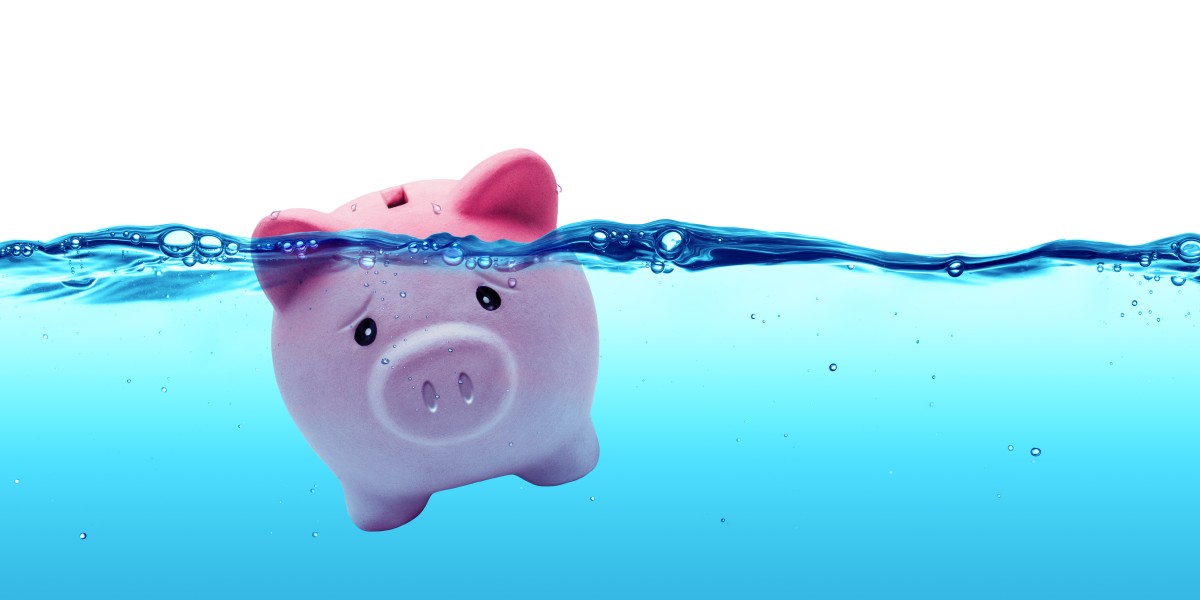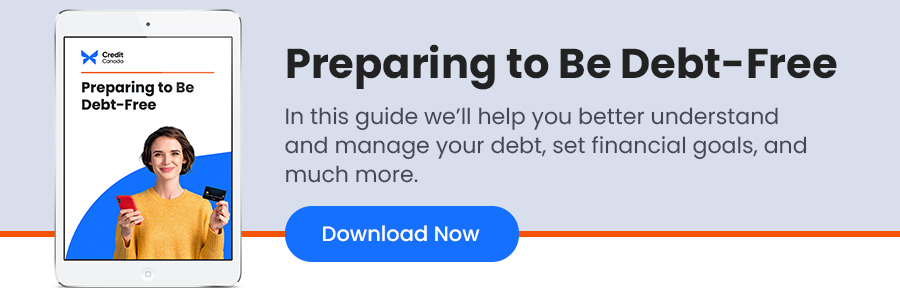
Are you drowning in debt? Have calls from creditors become a constant nuisance? Is it hard to set aside money for your personal needs and goals because you owe so much to credit card companies, banks, and other businesses? Being in debt can be incredibly stressful. However, you don’t have to go it alone.
Every day, people muster the courage to say “I am drowning in debt and need help!” Then, they go and find reliable debt counsellors who can help them find financial freedom.
How Many People Are Drowning in Debt?
Estimates from September of 2020 cite that the average Canadian owes around $73,532 in debt to various creditors — with mortgages being the chief source of debt. The same sources noted that the average person in Canada has non-mortgage debt of around $23,035. Considering that the average income in Canada for persons over the age of 16 is around $49,000 (the median is $37,800), this means that many people owe more than a year’s salary to their creditors.
The problem with excessive debt is that it can create a vicious cycle. If you owe a lot, you end up paying more towards your interest than to your principal balance — which makes paying off debt take longer. Since money’s already tight, it becomes tempting to take on more debt to pay for various necessities, which causes the debt to grow bigger and be even more difficult to pay down.
This vicious cycle becomes a massive whirlpool of debt for some — metaphorically drowning them in debt that just gets worse as time goes on.
Thankfully, you don’t have to face debt on your own. There are resources and organisations you can turn to if you need help treading water when you’re drowning in credit card debt!
Warning Signs You’re Drowning in Debt and Need Help
“Am I drowning in debt?” This is a very important question to ask yourself. There are a few warning signs that can tell you “I am in debt and need help right now!” This can include things like:
- Debts Never Seeming to Shrink. Sometimes, you can make every monthly minimum payment without seeing any appreciable reduction in your debt. If you make the monthly minimums, but the debt waters don’t seem to be receding, then you may be drowning in debt and need help!
- You Can’t Pay Your Monthly Minimums. Sometimes, the amount of money you owe can start to outpace your ability to pay it back. If you find that you can no longer afford to pay your creditors and cover basic necessities (like food, housing, and utilities), then you might be carrying too much debt.
- Constant Collection Calls. If creditors are sending your info to collection agencies, it’s a strong warning sign that they think you’re drowning in debt and that they’re at risk of not getting paid what they’re owed.
- Reduced Credit Score. One of the things that affects your credit score is how much credit you are using versus the amount available to you. If you’re riding your limits too closely, your credit score may drop since creditors will see you as more of a risk. So, a drop in your credit score could be an early warning that you are too heavily in debt for your own good.
- Playing “Hot Potato” with Credit Balances. Some people might try to put off paying down debt by using their credit cards to pay them off. This game of “hot potato” (where you pass the buck from one card balance to the next) can only delay debt — it doesn’t do a thing to eliminate it. Eventually, the game ends and you’ll be left holding a scalding hot potato that is worse than it was at the start of the game!
If you notice any of the above warning signs that you’re drowning in debt, it’s important to do what you can to reduce or eliminate your debt as soon as possible. You’ll thank yourself later!
What Are My Options if I am Drowning in Debt and Need Help?
Usually, if you feel like you’re “drowning” in debt, you’re already past the point where simply tightening the budget and focusing on simply paying the bills can stop your balances owed from growing. However, there are many options for those who are looking to get out of debt:
Debt Consolidation Loans
Wondering how to pay off debt? If you’re drowning in debt but still have good credit, you may want to look into getting a debt consolidation loan. This is a great way to manage your debt while minimizing the impact to your credit score.
How does a consolidation loan work? The basic idea is that you take out a loan equal to the total amount of debt that you currently have and use that to pay all of your other creditors. This helps in a couple of ways:
- Simplifying Your Debt Repayment. Instead of being in debt to a dozen creditors, you will only owe a single creditor. This makes arranging your payments easier and less stressful.
- Reducing the Interest on Your Debt. If you have good credit, there is a strong chance you’ll be able to get a favourable interest rate on your consolidation loan. In some cases, this may be lower than what your average interest rate was on your other debts. However, this isn’t always the case.
Unfortunately, not everyone who is drowning in debt can get a loan with good terms. If you’re seen as too much of a risk because of a low credit score, banks and other lenders may not want to work with you.
Debt Consolidation Programs
This is another method of consolidating debt that may be preferable if your credit is too damaged to qualify for a favourable consolidation loan. Instead of taking out a loan to pay debts, a debt consolidation program (DCP) is when a non-profit credit counselling agency works with your creditors to stop or significantly reduce the interest on your debts. Where a DCP is similar to a consolidation loan is how it rolls everything into a single, easier-to-manage payment.
Some people might prefer to avoid DCPs because they have to give up their unsecured credit cards while on the program. However, people who need to use credit cards may still use secured or prepaid cards while on a DCP.
A DCP is usually customized based on your current debt situation so that you can pay it off within 48 months (4 years) or less. The goal is to create a payment plan that won’t put too much of a strain on your resources while eliminating your debt.
Consumer Proposals
A DCP is often the best way to take care of debt before it can get too out of hand. However, such programs aren’t for everyone. If your debt is too great, it may be necessary to pursue more drastic measures to eliminate your debt. One such measure is signing up for a consumer proposal.
A consumer proposal is one of the ways that “insolvent” debtors (people whom have more debt than they can realistically repay) that is somewhat less severe than outright filing for bankruptcy. These proposals are administered by a Licensed Insolvency Trustee (LIT) like MNP LTD., who arranges for you to pay a portion of your debt or extend the time you have to pay that debt back (or both).
This is a near-last resort measure for people drowning in debt — one that creditors may not accept if they think that the proposal is less favourable to them than bankruptcy proceedings (where they may be able to recoup some costs from selling your assets). Creditors who do accept consumer proposals often do so because they’d rather recover a portion of what they’re owed instead of risking not getting paid at all.
Filing for Bankruptcy
Where a consumer proposal allows you to pay only a portion of your debt back to your creditors or extend your timeline for repayment, filing bankruptcy proceedings will eliminate most of your debts almost immediately. However, while both procedures are overseen by LITs, there can be a world of difference between the two — both during and after they’re done.
Bankruptcy is usually best saved as a last resort for if you’re truly drowning in credit card debt or other forms of debt that can’t be resolved by any other means. A bankruptcy filing will have a severe negative impact on your credit. Typically, you can expect your credit rating to be stuck at a 9 (the lowest there is) for at least six years after being discharged from bankruptcy.
Additionally, your LIT may end up having to sell some of your assets to cover your debts — filing for bankruptcy doesn’t mean your creditors get nothing, after all. The specific means of sale will vary depending on your situation and the LIT you work with. For example, it might be necessary to prioritize speed of transaction over the value of the sale. This may result in you getting less from the sale of your assets than you might have gotten otherwise.
When Drowning in Debt, Reach Out for Help!
Remember, you don’t have to face your debt alone. There are resources and organisations that are there to help you understand your debt and create a roadmap for getting out of it. For example, our debt calculator can help you learn more about your debt situation and how long it might take you to pay off your debt with your current resources.
Alternatively, you can reach out to Credit Canada for more information and advice. Our Credit Counsellors are here to help you with free, non-judgmental advice for managing your debts. Call us at 1.800.267.2272 to get started!

Frequently Asked Questions
Have a question? We are here to help.
What is a Debt Consolidation Program?
A Debt Consolidation Program (DCP) is an arrangement made between your creditors and a non-profit credit counselling agency. Working with a reputable, non-profit credit counselling agency means a certified Credit Counsellor will negotiate with your creditors on your behalf to drop the interest on your unsecured debts, while also rounding up all your unsecured debts into a single, lower monthly payment. In Canada’s provinces, such as Ontario, these debt payment programs lead to faster debt relief!
Can I enter a Debt Consolidation Program with bad credit?
Yes, you can sign up for a DCP even if you have bad credit. Your credit score will not impact your ability to get debt help through a DCP. Bad credit can, however, impact your ability to get a debt consolidation loan.
Do I have to give up my credit cards in a Debt Consolidation Program?
Will Debt Consolidation hurt my credit score?
Most people entering a DCP already have a low credit score. While a DCP could lower your credit score at first, in the long run, if you keep up with the program and make your monthly payments on time as agreed, your credit score will eventually improve.
Can you get out of a Debt Consolidation Program?
Anyone who signs up for a DCP must sign an agreement; however, it's completely voluntary and any time a client wants to leave the Program they can. Once a client has left the Program, they will have to deal with their creditors and collectors directly, and if their Counsellor negotiated interest relief and lower monthly payments, in most cases, these would no longer be an option for the client.







